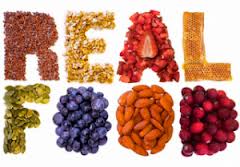Going Organic
Post details
Posted on 25th July 2015

In a previous blog, we stressed the importance of removing as many processed foods from your diet as possible due to the overwhelming amount of chemicals in those products from food processing which is intended to increase the appeal to consumers and the product's shelf life. We also encouraged you to try and eat only 'wholefoods' which if you have had a go at you will have realised that it pretty much limits you to just fresh meat, fish/seafood, some grains, vegetables, fruit, nuts, seeds, butter and oils. One of the main reasons a wholefood is considered 'whole' is because to some degree it will have all three macronutrients present in some quantity i.e. a wholefood contains protein, carbohydrate and fat. Most processed foods have been denatured by human intervention somewhere along the way and often contain just one or two of the macronutrients and more importantly they are often lacking in vitally important micronutrients like vitamins, minerals and enzymes. As a result, without the all important enzymes these de-natured, damaged foods are difficult to absorb, placing a stres on the digestive system. Furthermore, processed foods tend to actually cost the body vital energy and nutrients to be able to breakdown, digest and assimilate.
Another way to ensure your food doesn't contain a huge amount of harmful toxic chemicals or is processed and consequently damaged is to GO ORGANIC ! Organic certification means that the plant or animal has been grown/bred without the use of chemical fertilisers, pesticides, funcides or any other chemicals often used in farming processes. There is tons of research out there nowadays showing the higher levels of micronutrients present in organic meats and vegetables when compared to most of the commercially farmed produce we find in our supermarkets today. Unfortunately, most of our farmed products in the 21st century have far less nutritional value than they did say 60-70 years ago and therefore going organic is one way of clawing back the deficit caused by current commercial farming methods and the consequentially damaged soils that result from the use of fertilisers etc...
Below is my list of recommendations for how to go organic:
-
Buy your food from farmshops or farmers markets
-
Get your weekly shop from Riverford Organics. There's a 10% discount to Bodyguards clients who have their box delivered to the gym (delivery every wednesday)
-
Be aware that true organic products have an 'Organic Certification' stamp on any packaging and that if a product claims to be 'organic' but does not display the certification stamp, it probably lacks nutrients and contains a cocktail of toxic chemicals!
-
Choose 'grass fed' (not corn fed) organic meats and dairy products because this means the animals have been reared on a diet of organic feed and therefore aren't eating all the chemicals we're trying to avoid.
-
Read the labels ! If your product has any unpronounceable ingredients that look like they belong more to a chemistry set than a food - Don't eat it !
Book your session now
Call us or send us a message to book a session at BodyGuards.
Book nowMore blog posts
-
Single Leg Glute Bridge
Posted on 4th October 2020
Benefits of the single leg glute bridge
-
Plank Plate Presses
Posted on 2nd October 2020
Combine core activation and shoulder stabilisation in one movement
-
Elevated Heels for the Romanian Deadlift
Posted on 30th September 2020
Elevating your heels will alter the emphasis on key muscles when performing this exercise
